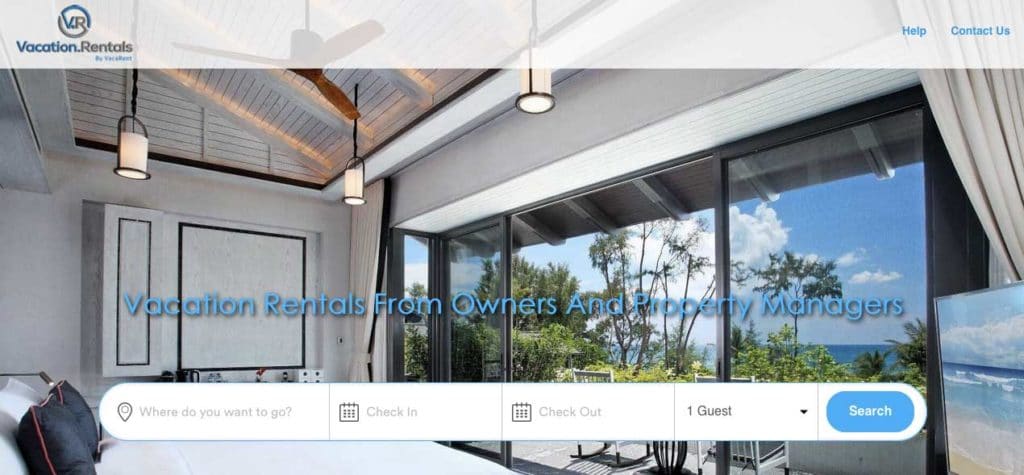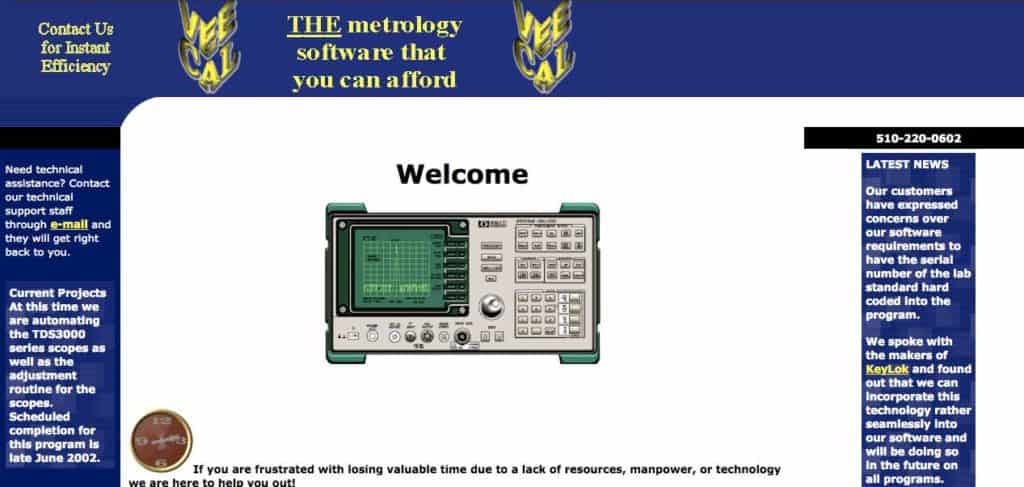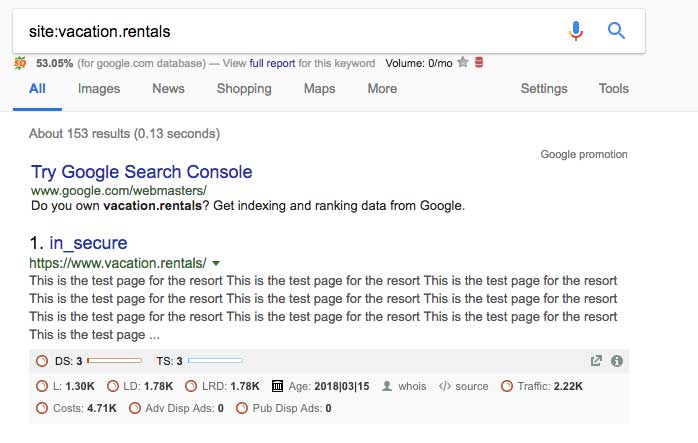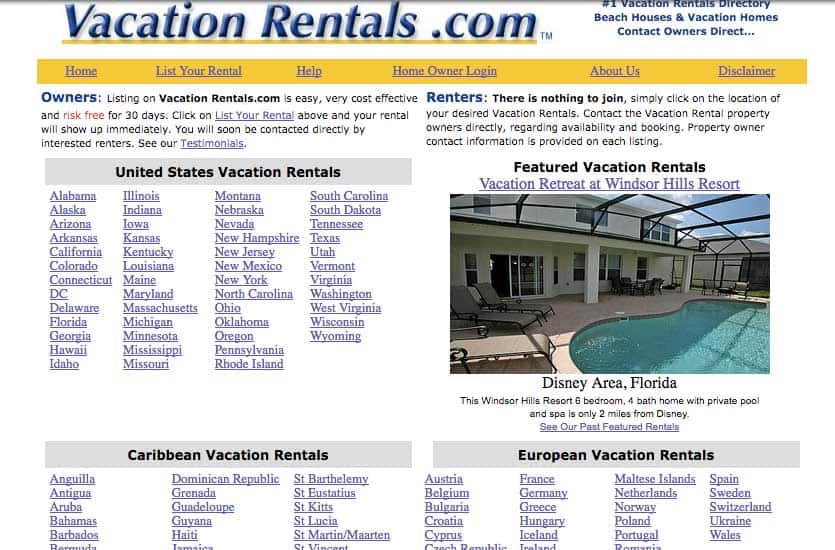This post is about a man who paid over half a million dollars for a domain name to gain an SEO advantage, and why I think it was a huge mistake.
The Backstory: who spends $500,300 on a domain?
Back in 2015, ICANN released over 500 new TLDs (top level domains) like .dog, .xyz and .reviews. Recently, the highest price was paid for one of these new TLD domains: Vacation.Rentals sold for a whopping $500,300 (the $300 was to make sure it was the highest – home.loans sold for $500,000 last year).
I read the news on one of my favorite blogs, Domain Name Wire, and listened to an interview with the new owner of Vacation.Rentals, Mike Kugler, on the DNW podcast. I excitedly opened my laptop and navigated to Vacation.Rentals to see how the site was being launched… and was shocked to find this homepage:

That can’t be right, I thought. This can’t be the homepage of a $500,300 domain. I checked the URL several times, maybe it was meant to be vacation.rental. Nope. I checked archive.org to see how long the site had been live. An entire month…
Mike Kugler got his start online with SEO, back in the days when exact match domains (EMDs) were a huge advantage (keep this in mind for later), and he’s not new to the vacation rental market; Mike’s company is VacaRent (https://vacarent.com/), and he also owns a bunch of other domains with new TLDs, including:
apartmentfor.rent
rvpark.rentals
land.rentals
sportfishing.guide
He also has some .com domains that pre-date the new TLDs, like HuntersFriendResort.com, and has experience in local holiday rentals in Branson, Missouri (reminds me of Netflix’s Ozark).
Looking at a few of Mike’s other sites, I get the impression that while there’s a big budget for buying domain names, design is low on the list of priorities.

Mike’s background in SEO is what got my attention. Here’s how he got his start:
Before I was a resort owner, I was a programmer and I invented a company called VeeCal.com and I used the search engines at the time to promote our software to the top of the search engines with automated calibration software.
Archive.org shows VeeCal.com dates back to 2002. The main keyword is “automated calibration software”, a term that it stills ranks on Page 1 for today. Not bad after 17 years!

By 2003, the site changed its title tag to “automated calibration software” – something that Mike acknowledges was important to SEO at the time:
When we opened up a Branson resort, I continued using what I knew about search engines, understanding title bars, meta tags, the importance of URL, positioning longtail names etc and for years that’s all we’ve done, just worked with the search engines to be able to go on and bring in the customers that we need.
Alarm bells were already going off in my head when I heard this description of SEO. Yes, that worked great in 2002. Actually, all the tactics Mike mentions worked pretty great until 2012, when the Penguin and EMD updates hit. But it’s not so simple in 2018.
To give Mike some credit, he’s focusing on on-page SEO, which if often overlooked by people in favor of aggressive backlink building. But I started to get worried when I learned why Mike wanted to acquire vacation.rentals: because it is an EMD:
It’s an absolute exact match domain for us… our URL database is set up so that it immediately goes city and state, so it will be https://vacation.rentals/dallas-texas-condo-etc… we’ll marry that with the title bar, maybe in the header tag, we don’t know, and we’ll try to give relevant results.
That’s a valid URL structure, but it can be done just fine without an EMD, like this: https://www.vrbo.com/vacation-rentals/usa/texas/prairies-lakes/dallas
At the moment, Vacation.Rentals is not optimizing URL structures very effectively:

It’s early days, but the Google index also does not look promising for a site that’s primarily using SEO for lead gen:

Exact Match Domains are Dead
Just kidding! But they’re not doing great. Here are just some of the reasons they are not worth much:
- Google’s EMD update scrubbed the SERP of low quality exact match domain names, and the algorithm no longer favours them.
- Difficult to brand, especially with new TLDS; who can remember the difference between vacations.net, vacation.com or vacation.rental? This affect word-of-mouth advertising and brand recognition.
- You probably won’t own your social accounts. Unless you started an EMD many years ago, you’ll never get a branded Twitter handle or Facebook page URL (to illustrate: Vacation.Rentals uses the Twitter handle @Owner_Rentals)
- There’s no insurance against changing search trends. Image you’ve built a site around vacation.rentals, and it turns out that people stop using the terms in favor of something like “holiday leases”, on the back of some big-budget advertising campaigns (and competitors for the term certainly have the budget for that!).
Mike’s site VacaRent.com is actually far better suited to rank in today’s SEO climate. And a whole $500,290 cheaper.
To his credit, Mike acknowledges that his ideas go against the grain:
I understand that people say that search engines don’t use exact match domain and I don’t buy that because… you go to the Internet and type up something…and the first thing that comes up is the exact match domain.
I think Mike’s hunch is strongly down to the success of VacationRentals.com, but he’s ignoring the residual success that it and other old EMDs hold over from the ‘good old days’ of SEO in the 2000s.
Why focusing on a single keyword is a huge mistake
Mike’s data is not wrong, the keyword “vacation rentals” gets an estimated 135,000 monthly searches in the US, according to Google’s Keyword Planner. But in his excitement to own the exact match domain, he’s overlooked some important SEO elements that are needed to rank in 2018.
Longtail keywords bring in the most traffic
While longtail keywords have low search volumes, if you add them all up, they actually make up more queries than shorttail keywords like “vacation rentals”. According to data collected by ahrefs, 4+ word keywords actually make up more than 60% of all searches. Yes, ranking page 1 for “vacation rentals” will bring in plenty of traffic, but not as much as all the longtail variations. Think “vacation rental near Indiana” or “where to rent for my next vacation”.
What confuses me, is that Mike seems to already understand the important of longtail keywords, as evidenced in his local vacation site, HuntersFriendResort.com. The site ranks page 1 for terms like “jet ski rental branson mo” but doesn’t come close for shorttail terms like “vacation branson” or “branson resort”.
Search intent is vital
Ranking for huge, generic search terms like “vacation rentals” might seem great for SEO, but it disregards search intent. Ranking for more specific terms, like “luxury vacation rental near Lake Michigan” is much better because the search engine traffic will convert if your page offers the correct solution. Optimizing pages for generic keywords means you have little idea about the people visiting the page. Do they have a lot of money? Do they like to book online or call for more information? Do I have inventory where they are searching? You will never know. Longtail, targeted keywords help you serve the user with better information, and increase your conversions.
Over-optimisation no longer works
I’m a big fan of ignoring Google’s official advice, but data shows the era of the EMD is over. Yes, VacationRentals.com might rank top for the exact match keyword, BUT this is thanks to many factors and the domain name is not going to give it enough power on its own. In fact, if you search for something more specific, like “vacation rentals California”, you won’t find VacationRentals.com until position number 9, so it’s not that powerful. It’s likely that Google sees VacationRentals.com as a brand name, given its age and history.
Aged domains hold all the power
The top ranking sites for massive, established keywords like “vacation rentals” have been around for a while. VacationRentals.com dates back all the way to 1999. The new kids on the block, AirBnB.com have only been around since April 2009. That’s still over 9 years! Trying to smash into the SERPs alongside these powerhouses is going to take more than an exact match domain name.
UX is a huge ranking factor
You can have whatever domain you like, but if your site’s UX is no good (and vacation.rental leaves a lot to be desired) your rankings will suffer.
Competing with AirBnB and big-name competitors
It’s clear that Mike wants vacation.rentals to compete with AirBnB, Home Away and other major vacation rental sites. But you’ve seen the screenshot I posted earlier – Vacation.Rentals is an amateur-looking Lavarel site.
Here’s the AirBnB homepage, followed by another screenshot of the bottom half of the Vacation.Rentals homepage:


Would you trust the second site with your home? The site is promoting its SEO ranking potential as a benefit to customers. Here’s a quote from the website:
Human beings search the way they speak and think. They search for COMMON phrases. Phrases like “Homes for rent….” or “Beachfront property….” or even “Condos on the lake…” All of these are good phrases.
But the absolute winner BY A LANDSLIDE is….
V-A-C-A-T-I-O-N
R-E-N-T-A-L-S
Mike Kugler is so excited about the keyword “vacation rentals”, he has a whole page dedicated to it on the site. The problem is, it’s just a theory. Yes, the keyword gets a lot of searches, but Vacation.Rentals does not rank for it!
The Elephant in the Room: VacationRentals.com
Let’s pretend for a moment that an EMD is still a good idea in 2018.. then VacationRentals.com will always dominate the SERPs! HomeAway bought the domain back in 2007 for $35.6 million. Yes, that’s a ton of money, but it was a very big directory site at the time, with a lot of targeted traffic. Even if HomeAway CEO Brian Sharples said they only bought it to stop Expedia from getting it.

It was easy for HomeAway to get value from VacationRentals.com – they gain access to a huge directory of owners, they have an exact match domain for SEO (which worked well in 2007 and for a while after), and they gain a competitive advantage over Expedia.
But Vacation.Rental offers none of these advantages, and it will always sit in the shadow of its .com EMD counterpart.
Oh, and by the way, HomeAway also own VacationRental.com, which redirects to VacationRentals.com. The domain Vacation.Rental is not available from ICANN, but Vacation.Rent is, and it is not owned by Mike Kugler, adding additional risk (and dilution) to the domain name Vacation.Rentals.
Was it worth it for the PR?
It’s not all bad news, Mike has some good instincts. Most notably, he paid $300 extra for Vacation.Rentals because he knew that it would make it the most expensive new TLD domain sold to date, and that would buy him some PR. And it worked; Mike’s first ever podcast interview was the one I heard on Domain Name Wire, and I’ve seen a couple of other news stories about the sale, but very little so far. Perhaps more interest will be generated in the coming weeks (at the moment the story is relatively new), but it’s certainly not $500,300 worth of advertising, and hasn’t generated any significant backlinks.
How I would spend $500,300 on SEO
If I was starting a vacation rental company, with a $500,300 budget, I’d spend $10 on the domain name. Why? Because for $10, I can start a brand. Here are some of my biggest competitors for the search term “vacation rentals” in the US:
vacationrentals.com
homeaway.com
tripadvisor.com/rentals
expedia.com/vacation-rentals
airbnb.com
flipkey.com
orbitz.com/vacation-rentals/
hometogo.com
How many times do you see the term “vacation rentals” in the actual domain name? Once. And it’s the .com. And it’s owned by homeaway.com, a huge BRAND. It would be impossible to brand Vacation.Rentals in a distinct way.
Here are some basic available $10 domains that could be branded into a vacation rental site:
getvacationed.com
easyliferentals.com
matchmakervacations.com
homeiswherethevacationis.com (maybe too long, but you get the idea!)
I would then spend $500,290 on the actual site and marketing, creating something that differentiates me from the competitors – maybe the best city guides on smaller cities, maybe take better photos (that’s actually how AirBnB took off). Half a million will cover an ambitious SEO campaign and site development that would guarantee site traffic and revenue. Spending $500,300 on a domain name does not.
Is Vacation.Rentals really worthless?
To an extent, yes. As a new domain, it offers very little SEO benefit. It is perhaps of some value to a competitor (like HomeAway who owns VacationRentals.com), but will be unlikely to achieve such a high price tag again unless it had some serious traffic.
I believe that Mike Kugler bought Vacation.Rentals based on its potential, and that potential is worthless without hundreds of thousands of dollars of work designing the site, creating content, developing a business plan and advertising to its target market. And if all of that goes well, it could have been achieved with a different domain.
Mike bought the domain with “a total of 6 partners”, so at least his risk is spread. I hope the other partners have some say in how the site is developed.
I’ll be keeping an eye on Vacation.Rentals and its search engine rankings in the coming months, and I wish Mike the best of luck with the project.
UPDATE: Vacation.Rentals is now ranking Page 1 for “Vacation Rentals”! How did they do it? Read my SEO analysis here!

